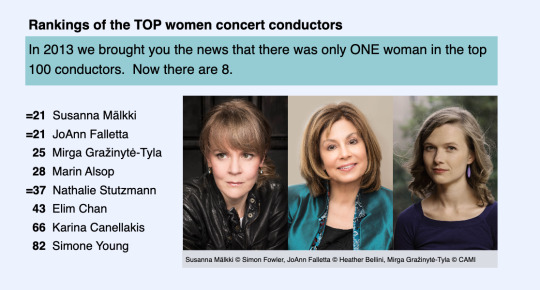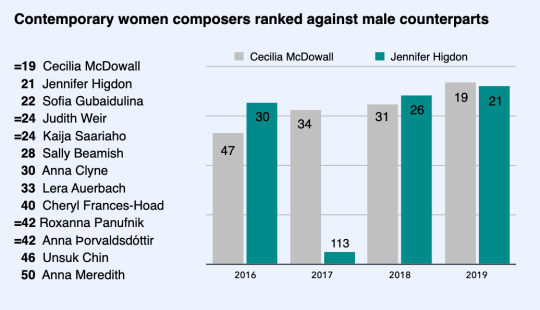#Jennifer Higdon
Explore tagged Tumblr posts
Text
Jennifer Higdon
Happy birthday, Jennifer Elaine Higdon!
youtube
0 notes
Text
Internationale Hugo-Wolf-Akademie - Thomas Hampson e Wolfram Rieger
Foto ©IHWA La Hugo-Wolf-Akademie ha concluso la sua stagione con il recital di un’ autentica star del canto come Thomas Hampson, Continue reading Untitled

View On WordPress
#canto#critica#dvorak#hampson#henry t. burleigh#hindemith#ives#jean berger#jennifer higdon#leonard bernstein#lieder#mahler#margaret bonds#novecento#piano#wolfram rieger#zemlinsky
1 note
·
View note
Text
classical pieces that give me the same energy as the car
my classical phase is coming back bear with me
sergei rachmaninoff- morceaux de fantaisie op. 3 no. 1: elegie (sheku kaneh mason, cello & isata kaneh mason, piano)
jennifer higdon- harp concerto movt. 3: lullaby (yolanda kondonassis, harp; rochester philharmonic, orchestra)
pt. ravi shankar, philip glass- ragas in minor scale (ravi shankar, sitar et. al)
gian carlo menotti- violin concerto (jennifer koh, violin; spoleto festival orchestra)
erich korngold- theme for deception (1946)
einojuhani rautavaara- deux serenades no. 1: serenade pour mon amour (hilary hahn, violin; orchestre de philharmonique radio france)
franz schubert- nacht und träume, op. 43, no. 2 (peter pears, voice & benjamin britten, piano)
sergei prokofiev- piano concerto no. 3, op. 26 (martha argerich, piano; berliner philharmoniker orchestra)
#the way there's no actual thought behind this. it's based purely on Vibes#also bcs this is the gay website; a fun fact for y'all: britten and pears were boyfriends#classical music#the car#Spotify
40 notes
·
View notes
Note
What are some of your favorite operas?
my absolute favorite is l’elisir d’amore. i also really like mozart’s operas in general. love puccini, and i did an aria from jennifer higdon’s cold mountain a few years ago and it was amazing.
33 notes
·
View notes
Text
I'm looking at the promotional material for next season with my local symphony orchestra, the North Carolina Symphony Orchestra in Raleigh, and if I buy an 8-ticket package, I think I'd use them for these seven concerts, with two tickets for my partner and me to hear Carmina Burana right around my birthday next year. There are some really interesting contemporary pieces being programmed, and some of the soloists, such as Paul Watkins, are major figures.
17-18 October 2025 Chávez: Sinfonia India Copland: Clarinet Concerto (w/Samuel Almaguer) Copland: Symphony No. 3
14-15 November 2025 Jennifer Higdon: Suite from Cold Mountain Schumann: Cello Concerto (w/Paul Watkins) Beethoven: Symphony No. 3, “Eroica”
9-10 January 2026 Orff: Carmina Burana
6-7 February 2026 Bernstein: Music from On the Town John Adams: Saxophone Concerto (w/Timothy McAllister) Gershwin: Porgy and Bess: A Symphonic Picture Johnson: Victory Stride
20-21 March 2026 Beethoven: Piano Concerto No. 5, “Emperor” (w/Anne-Marie McDermott) Bartók: Concerto for Orchestra
10-11 April 2026 Rautavaara: Symphony No. 7, “Angel of Light” Mozart: “Great” Mass in C Minor
8-9 May 2026 Gabriela Ortiz: Kauyumari Copland: Appalachian Spring Revueltas: La noche de los Mayas
2 notes
·
View notes
Text

"We Wish a very Happy Birthday to One of the Greatest Violin Players of our time Hilary Hahn
Hilary Hahn (born November 27, 1979) is an American violinist. A three-time Grammy Award winner, she has played as a soloist with orchestras and conductors, and as a recitalist. Several composers have written works for her, including concerti by Edgar Meyer and Jennifer Higdon, partitas by Antón García Abril, two serenades for violin and orchestra by Einojuhani Rautavaara, and a violin and piano sonata by Lera Auerbach."
5 notes
·
View notes
Text
100 Days of Practice, Day 1
Today I started working on audition excerpts for band/orchestra auditions in September. Our excerpts are from the Mozart oboe concerto (always), Jennifer Higdon’s Concerto for Orchestra, and the overture to Rossini’s La Scala di Seta. My chops have been weakened™️ by my inconsistent practice since school got out (since before school got out tbh), so I was only able to get through 40 minutes of practice.
Practice breakdown:
10 minutes of long tones
10 minutes of scales
10 minutes of Mozart
10 minutes of Higdon
Total cumulative practice time: 40 minutes
4 notes
·
View notes
Text




Tubist Jake Alford & euphoniumist Justin Weis performed the works of Jennifer Higdon, Amanda Harberg, Andrew May, Jennifer Bernard Merkowitz, and Justin's own piece entitled Plaything for The Leonard Falcone Euphonium & Tuba Festival Winners Recital at The U.S. Army Band 2025 Tuba-Euphonium Workshop. #LeonardFalcone #Falcone #Euphonium #Tuba #TEW2025 #TEW #Music
0 notes
Text
Violinist Timothy Schwarz Releases Fifth Album as a Leader
Stock photo Recognized for his solid technique and considerable flair, acclaimed violinist Timothy Schwarz continues his career-long dedication to championing American composers with his latest recording The Living American. The Living American is a collection of contemporary works for violin by seven of today’s leading living American composers: Steven Sametz, Jennifer Higdon, Jessie…

View On WordPress
0 notes
Text
thinking abt the collabing with a composer thing on this, the obvious first choice owen pallet. obviously. if not them though, i'll love to see nico muhly given how close he was to working on tlsp1. we need a muhly and turner project at some point the world needs it. my personal choice would be jennifer higdon for no other reason than i absolutely fuckin' love her and her work.
if alex ever puts out an album of orchestral reimaginings of the car and tbhc (or even them older) songs, know that i'll pay with my blood for that shit
63 notes
·
View notes
Photo

Jennifer Higdon
Gender: Female
Sexuality: Lesbian
DOB: 31 December 1962
Ethnicity: White - American
Occupation: Composer, musician, professor
50 notes
·
View notes
Photo



Women compose. Women conduct.
[ more 2019 stats here! ]
189 notes
·
View notes
Text
Happy Pride Month!!

(Classical composers edition)
#pride#pride month#pyotr illych tchaikovsky#tchaikovsky#samuel barber#barber#leonard bernstein#bernstein#pauline oliveros#wendy carlos#jennifer higdon#nico muhly#lgbtq pride#lgbtq
6 notes
·
View notes
Note
Operas are continuously revived (currently in an American premiere of a forgotten French operetta!). The unfortunate bit is that recordings aren’t often available and production runs tend to only be a few weeks at most, so you have to search to see new stuff.
Opera is also very regional. There are thriving opera scenes across the globe, but because of language differences, lack of marketing, and the absence of readily available pro-shots, many of these operas are not known outside of their area. In the past five years, I’ve been lucky enough to see many non-canon operas live in my city:
Daniel Catán's La hija de Rappaccini (Mexico, 1996, Spanish)
Hermogenes Ilagan’s Dalagang Bukid (Philippines, 1917, Tagalog)
Uzong Choe’s As the Moon Arrives on the Waters (South Korea, 2018, Korean)
Uzong Choe’s 1945 (South Korea, 2019, Korean)
Liliya Ugay’s Chhlong Tonle (USA, 2021, English)
Daniel Catán's Florencia en el Amazonas (Mexico, 1996, Spanish)
Mark Adamo’s Little Women (USA, 1998, English)
Eugen d’Albert’s Tiefland (Germany, 1903, German)
Federico Moreno Torroba’s Luisa Fernanda (Spain, 1932, Spanish)
Jake Heggie’s Dead Man Walking (USA, 2000, English)
Jennifer Higdon’s Cold Mountain (USA, 2016, English)
Laura Kaminsky’s As One (USA, 2016, English)
Plus a bunch of smaller premieres from up-and-coming composers and revived operas from every era
There’s definitely a passion for works outside of the canon and introducing audiences to new stuff, but it takes time. Localized operas tend not to become part of the canon because joining the canon takes reviews, critical success, and countless productions to determine if a work is relevant, singable, accessible, and enjoyable. Opera companies rely on audiences’ tickets to fund the work they do, and it’s easier to sell tickets if people recognize La Traviata from Pretty Woman versus a random premiere from a composer they’ve never heard of.
Why modern academic composers don't write new operas? When staging and re-staging the same old pieces, over and over again, will be enough?
I look at your opera posts and reblogs and I just don't get the appeal. It's all so limited and stagnant, people pay attention to the smallest details because there is nothing else to think of, no revelation and inspiration.
They are all the same, like a seven or ten of them that every theater in the world had chosen for the rest of eternity and that's all. If the genre is truly dead and can not be revived, well, but why don't revive some real old operas?
Once I had to work with some Italian library, and they had DOZENS of printed librettos and notes of different 19th century operas of different composers from France, Germany and Italy, there were even several "Beauty and the Beast" kind of things. Opera was so diverse and big back then. It was fun.
There must be something hidden and pretty, something more than a group of over-used big names.
(Just in case, it wasn't negativity, I'm just thinking)
I'm all in favor of new operas and of reviving the countless obscure older ones. But I'm afraid you've come to the wrong person to complain about the constant re-staging of the popular warhorses.
Maybe it's because I'm autistic, but I like revisiting the same operas again and again, with different singers, conductors, and staging. I like seeing each different performance breathe new life into the same opera and find new insights into the plot and characters. For me at least, there is revelation and inspiration in it.
29 notes
·
View notes
